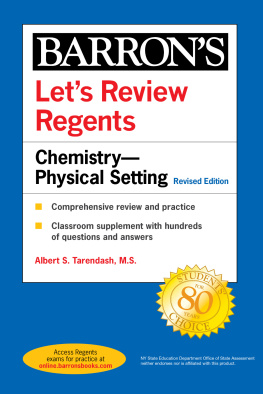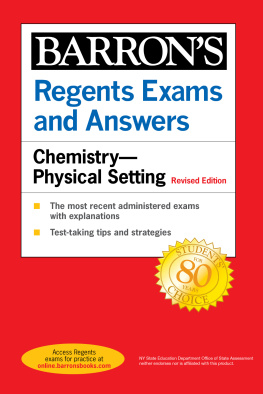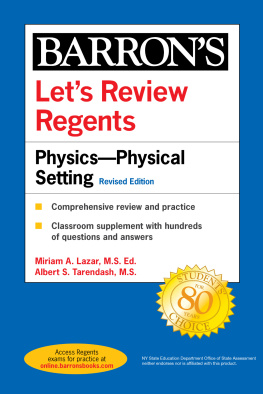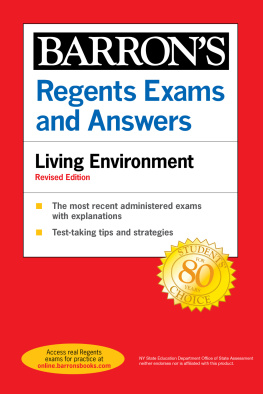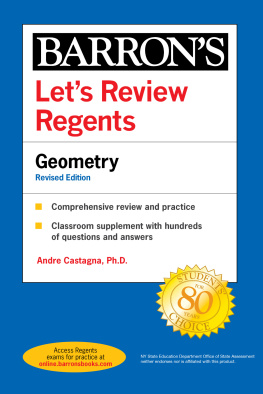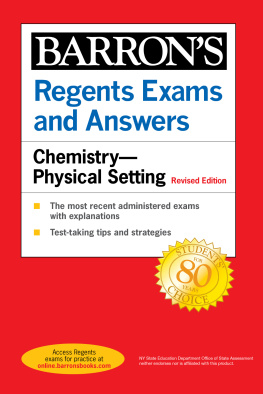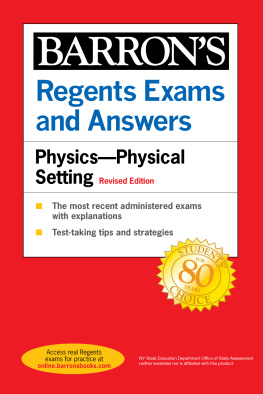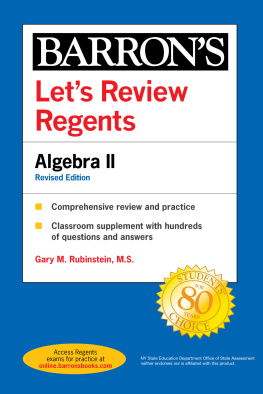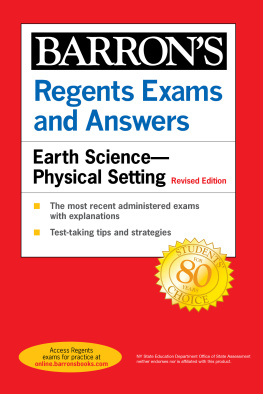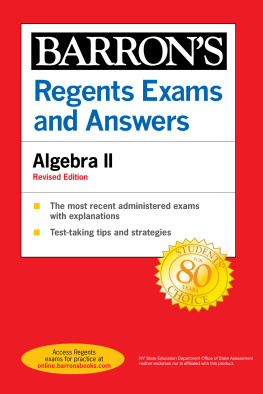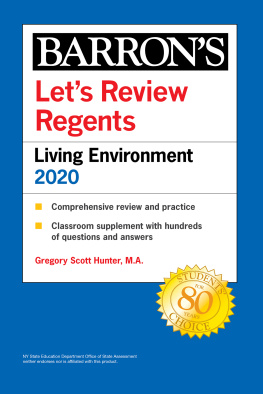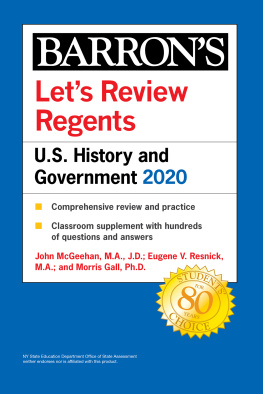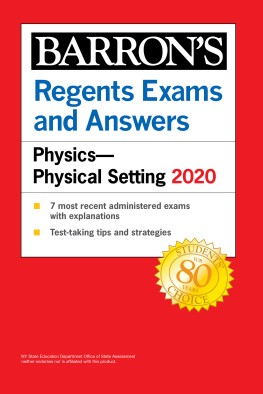Albert S. Tarendash - Lets Review Regents: Chemistry—Physical Setting (Barrons Regents NY), Revised Edition
Here you can read online Albert S. Tarendash - Lets Review Regents: Chemistry—Physical Setting (Barrons Regents NY), Revised Edition full text of the book (entire story) in english for free. Download pdf and epub, get meaning, cover and reviews about this ebook. year: 2020, genre: Children. Description of the work, (preface) as well as reviews are available. Best literature library LitArk.com created for fans of good reading and offers a wide selection of genres:
Romance novel
Science fiction
Adventure
Detective
Science
History
Home and family
Prose
Art
Politics
Computer
Non-fiction
Religion
Business
Children
Humor
Choose a favorite category and find really read worthwhile books. Enjoy immersion in the world of imagination, feel the emotions of the characters or learn something new for yourself, make an fascinating discovery.
- Book:Lets Review Regents: Chemistry—Physical Setting (Barrons Regents NY), Revised Edition
- Author:
- Genre:
- Year:2020
- Rating:3 / 5
- Favourites:Add to favourites
- Your mark:
- 60
- 1
- 2
- 3
- 4
- 5
Lets Review Regents: Chemistry—Physical Setting (Barrons Regents NY), Revised Edition: summary, description and annotation
We offer to read an annotation, description, summary or preface (depends on what the author of the book "Lets Review Regents: Chemistry—Physical Setting (Barrons Regents NY), Revised Edition" wrote himself). If you haven't found the necessary information about the book — write in the comments, we will try to find it.
Lets Review Regents: Chemistry—Physical Setting (Barrons Regents NY), Revised Edition — read online for free the complete book (whole text) full work
Below is the text of the book, divided by pages. System saving the place of the last page read, allows you to conveniently read the book "Lets Review Regents: Chemistry—Physical Setting (Barrons Regents NY), Revised Edition" online for free, without having to search again every time where you left off. Put a bookmark, and you can go to the page where you finished reading at any time.
Font size:
Interval:
Bookmark:
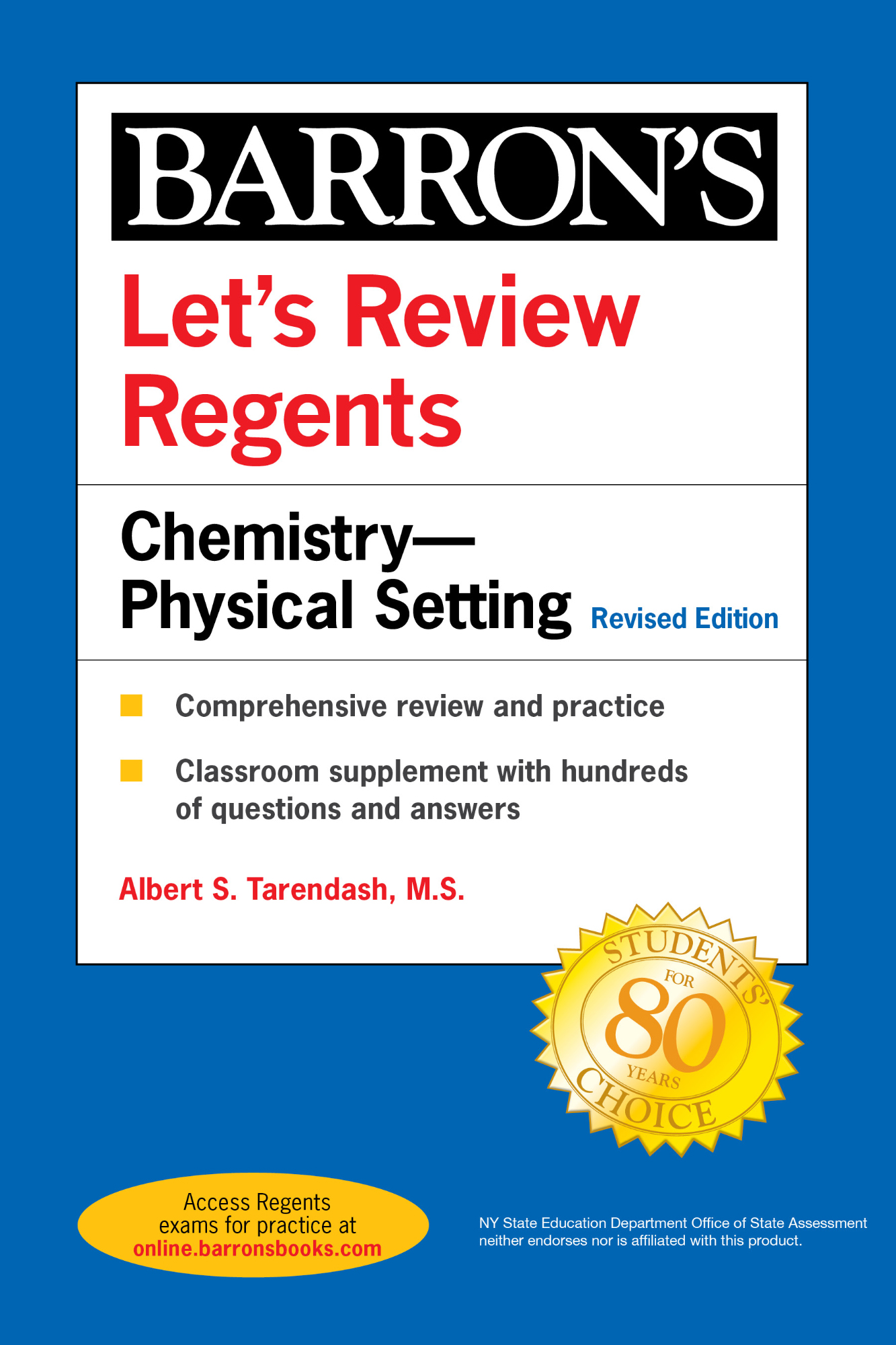
Copyright 2021, 2020, 2019, 2018, 2017, 2016, 2015, 2014, 2013, 2012, 2011, 2010, 2009, 2008, 2007, 2006, 2005, 2004, 2003, 2002, 2001, 1998 by Kaplan, Inc., d/b/a Barrons Educational Series
All rights reserved under International and Pan-American Copyright Conventions. By payment of the required fees, you have been granted the non-exclusive, non-transferable right to access and read the text of this eBook on screen. No part of this text may be reproduced, transmitted, downloaded, decompiled, reverse engineered, or stored in or introduced into any information storage and retrieval system, in any form or by any means, whether electronic or mechanical, now known or hereinafter invented, without the express written permission of the publisher.
Published by Kaplan, Inc., d/b/a Barrons Educational Series
750 Third Avenue
New York, New York 10017
www.barronseduc.com
ISBN: 978-1-5062-7825-4
This book has been written to help you understand and review high school chemistry. Chemistry is not a particularly easy subject. No bookno matter how well writtencan give you instant insight. Nevertheless, if you read this book carefully and do all of the problems and review questions, you will have a pretty decent understanding of what chemistry is all about.
I have designed this book to be your chemistry companion. It is more detailed than most review books, but it is probably less detailed than your hardcover text. The book is divided into 16 chapters. Each chapter begins with an overview (Key Ideas) and a summary of what you should learn in the chapter (Key Objectives). Most of the 16 chapters are then divided into two sections. Section I contains basic material that follows the New York State Regents Core syllabus very closely. Section II contains additional material that is not in the Regents Core but may well be part of your chemistry course (and is likely to appear on other standardized tests such as the SAT Subject Test in Chemistry).
This book provides a large number of problems with detailed solutions. Many of the problems are usually followed by a Try It Yourself exercise and its answer. You are encouraged to work out each and every exercise.
Each chapter ends with multiple-choice questions and, usually, one or more constructed-response and free-response questions. These are drawn from both Sections I and II. Appendix 1 contains the official New York State Regents reference tables that are used throughout the book, and Appendix 2 contains additional (non-Regents) tables that are used for Section II topics. Appendix 4 provides some information on how to answer various types of constructed-response questions.
If you have any comments about this book or if you find errors (for which I apologize in advance), please e-mail me at:

I wish you much success.
A. S. Tarendash
This book was written according to the following philosophy: A worthwhile review book should provide clear, careful, and detailed explanations that will, in effect, hold the students hand while he or she is studying the subject.
- Most of the 16 chapters are divided into two sections. Section I contains basic material that follows the New York State Regents Core syllabus. Section II contains additional material that goes beyond the New York State Core and may well appear on such standardized tests such as the SAT Subject Test in Chemistry.
- The additional reference tables have been revised to reflect recent discoveries, such as elements 117 and 118, and the naming of elements 113118.
- Thanks to reader correspondence, errors have been corrected extensively throughout the book.
- The end-of-chapter questions have been revised so that Section I questions contain more recent Regents examination material.
You may find that my ordering of the material is a bit unorthodox. Then again, we all have our own visions as to how a high school chemistry course should be sequenced. In the final analysis, you may not feel that the way I subdivided the material is appropriate for your teaching style or course. If you are more comfortable using your own order or the order shown in your textbook, you should certainly continue with that approach.
Rather than padding each section of the text with multiple-choice questions, I spent considerable time in working out sample problems. The text heavily emphasizes the factor label method (dimensional analysis) because I believe that this one area is where students experience considerable difficulties. In this vein, I have also included an additional appendix (Appendix 4) on how to answer constructed-response and free-response items. This appendix is designed to train your students to compose answers that are logical and orderly and that will not drive you crazy when you grade them!
I reserved the end of each chapter for the multiple-choice and constructedresponse questions, including free-response questions. I have not included the type of questions found on the SAT Subject Test. If you are preparing your class to take the SAT Subject Test, you should obtain a book published by The College Board that contains a variety of authentic, released SAT Subject Test examinations in all subjects, including chemistry. You will find the chemistry section of that book particularly helpful. You should make every effort to include at least a few SAT Subject Test-type questions on your class examinations throughout the year.
A final thought: Lets Review Regents: ChemistryPhysical Setting was never meant to be one of those thin Regents prep books. It was always designed to be a review of a complete introductory one-year course in high school chemistry as taught in most of the country. To New York teachers: Remember, the New York State Education Department took great pains to indicate that [the] Core is not a syllabus [Chemistry Core p. 3.] but a document to assist in planning a year-long chemistry course. In effect, the Core is merely a blueprint for questions that students might be asked on the Regents Chemistry examination. I firmly believe that no New York State high school chemistry teacher should be using the Core as his or her sole curriculum guide. In this vein, many New York teachers have recognized that omitting certain topics makes other basic concepts mysterious to their students. (Can one really teach Lewis electron-dot diagrams in a meaningful way if atomic sublevels and orbitals have been omitted?)
I hope that this book provides some new insights and that it will help you to ensure that you approach your lesson plans and lessons in a spirit of inquiry and problem solving. I also hope that Lets Review Regents: ChemistryPhysical Setting will be successful for both you and your students.
If you have any comments about this book or if you find errors (for which I apologize in advance), please e-mail me at:

No book is ever the work of one person. Once again, I wish to acknowledge and thank:
- The editors at Barrons for their guidance, patience, understanding, and gentle prodding;
Font size:
Interval:
Bookmark:
Similar books «Lets Review Regents: Chemistry—Physical Setting (Barrons Regents NY), Revised Edition»
Look at similar books to Lets Review Regents: Chemistry—Physical Setting (Barrons Regents NY), Revised Edition. We have selected literature similar in name and meaning in the hope of providing readers with more options to find new, interesting, not yet read works.
Discussion, reviews of the book Lets Review Regents: Chemistry—Physical Setting (Barrons Regents NY), Revised Edition and just readers' own opinions. Leave your comments, write what you think about the work, its meaning or the main characters. Specify what exactly you liked and what you didn't like, and why you think so.

